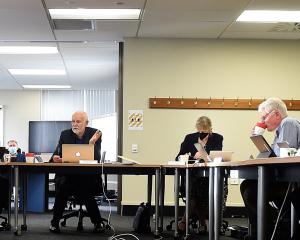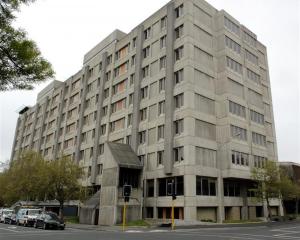Audit New Zealand has strong recommendations for the SDHB, Dunedin writer and former ODT health reporter Elspeth McLean documents them.
Urgent improvement to the cash-strapped Southern District Health Board's budgeting and forecasting practices is sought by Audit New Zealand.
The audit report for past financial year, released under the Official Information Act, makes seven recommendations, classing four of them as urgent.
Six months into the new financial year, the board's proposed annual plan, with a $14.8 million deficit in a budget with $879.5 million revenue, has yet to be approved by the Ministry of Health.
By the end of December, the board had blown this proposed budget, with its deficit at $14.9 million, $5 million more than planned for at that time.
Audit NZ said the board's key challenge was its ability to maintain sustainable services while achieving long-term financial viability and breaking even.
It noted the board's capital investment plan, including the urgency of investment in upgrading or replacing Dunedin's clinical services block, would present further ''significant financial challenge'' as any capital funding would ultimately affect the deficit though depreciation, the cost of finance or capital charges.
In this environment, ''it can be easy to lose sight of positives'', the auditors said.
As a result of savings the board made in 2014, the deficit support needed last financial year was $9 million, an improvement on the $11 million support needed the previous year.
Audit NZ's report, finalised in September, said to achieve this year's $14.8 million deficit the board would have to make a further $11 million in savings, but questioned the board's approach to this.
It expressed concern centralised budget changes had not been allocated to relevant lower-level budget holders.
These changes assumed an additional $1.3 million in revenue and a reduction in costs of $1.2 million.
Reducing staff costs by about $2 million through not filling some vacancies was also outside of allocated budgets.
The board, in a comment included with the report, said most savings targets had plans associated with them involving monitoring and reporting at budget level, but there were also other savings targets ''at a high level without plans''.
Further work on incorporating these into lower-level budgets was under way.
Audit NZ said it could not answer questions on whether it was possible for boards to have ideal budgeting processes in an environment where the Ministry of Health appeared to have a set idea about the size of the deficit it would allow, which could be at odds with what board budget holders considered achievable.
As these questions related to management decisions and government policy, it said they should be referred to the board and the ministry.
In his response to this, board executive director of finance Peter Beirne said the board accepted budget development and ownership required improvement and was working towards increased budget-holder involvement.
The ministry referred the questions to the National Health Board, which has yet to respond.
Audit NZ was critical of the inaccuracy of the board's financial forecasting in 2013-14, when multimillion-dollar revisions on earlier forecasts were required.
''The size and effects of these late revisions raise significant credibility concerns around the forecasting process and the overall effectiveness of the DHB's monitoring and reporting tools and processes.''
They also raised potential reputation risks for the management and the board.
The board said forecasting remained difficult as there were some factors the board had no control over and others for which information was not available even at the end of the financial year.
An example of this was finalising the annual amount of money changing hands between boards when they treated patients from another board's area, known as inter-district flows (IDFs).
Audit NZ questioned the way board management handled changes in clinical practice which could result in budget blow-outs.
It reviewed what had happened with coronary stents.
Unexpected increased use of a $1200 drug-eluting stent, rather than the $400 bare metal stent, had resulted in a $300,000 cost overrun.
The change in expected usage was due to a change in staff.
While Audit NZ praised the board for the way it responded once it identified the problem, it was unable to tell whether appropriate management approval had been given for the change in the practice.
Where significant changes in practice were anticipated they, and the relevant budget, should be reviewed and approved before changes were made so financial effects could be addressed.
The board pointed out the stent instance was a change in use of existing devices rather than the use of an unapproved device. Education to ensure greater understanding by clinical leaders and service managers
and the ability to provide early alerts about changes in practice were required, the board said.
Audit NZ raised concerns about risks from recently losing experienced finance staff.
This was a situation compounded by uncertainty over the timing and extent and scope of national shared services in this area.
The board intended to use extra fixed-term staff or external contractors to supplement the existing staff as well as recruiting replacements.
As the board went through this period of transition, Audit NZ said it was critical it had enough skilled and experienced staff to support the board adequately and who also had adequate understanding of the board's internal controls to minimise the risk of fraud or misstatement.
Audit NZ asked the board to urgently approve its policy on continuing medical education expenses, which has been under consideration since 2011.
The latest version of the policy is to apply to all South Island boards.
The board spends several million dollars annually on these expenses for senior doctors and in its previous audit it was asked to clarify its policy on what sort of expenses would be considered acceptable - classes of travel, purchase of alcohol, price of meals etc.











